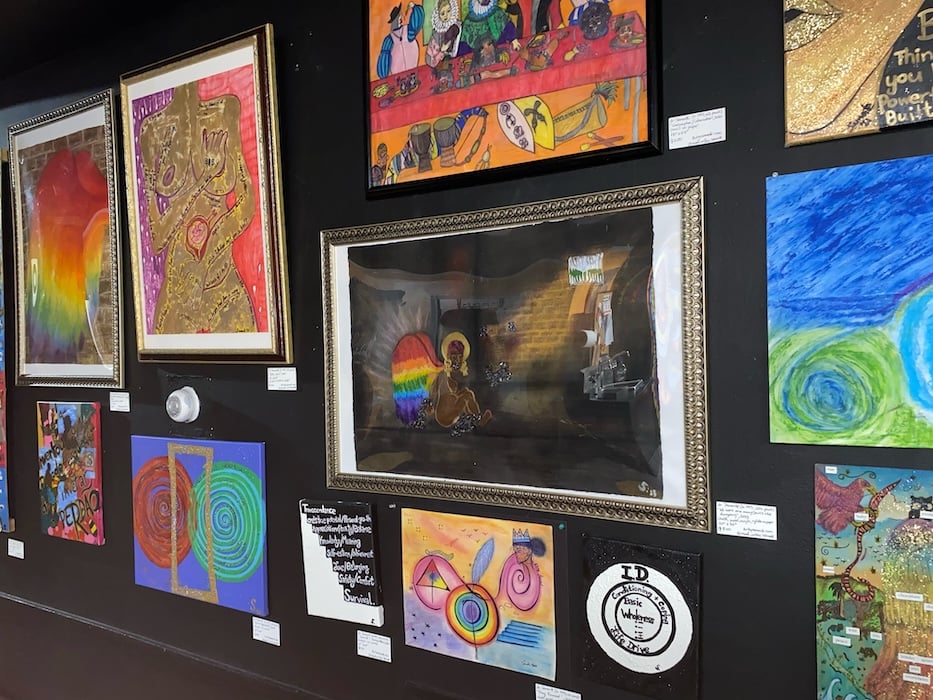
Jamiah Green Photos.
The words crawl in every direction across the figure’s coffee-colored skin, marking her arms and exposed torso in neat black lettering. It’s not a big deal, reads a phrase that stretches up her shoulder. You are the kind of woman your father would have thrown away, state three lines of text by her right breast, hovering just over the nipple. Which lifetime hurt you so bad? asks a sentence on her left arm.
The phrases seem to multiply, even on the static page. From her right elbow to her wrist: Colonization was made possible through the pillaging of our bodies. On her left hip: How do you heal from so many people’s pain? Directly across her body: Where do you feel the most pain?
Amanda “Semente” Caroline de Oliveira Pereira’s “Baby Girl” is one of the art pieces currently on display at Madeline’s Empanaderia, chef Hazel Lebron’s beloved Caribbean and Latin American restaurant and cultural collective nestled at 86 Spring St. in New Haven’s Hill neighborhood. Each month through the end of the year, the spot celebrates the work of a local maker or artist, in an attempt to show how closely the visual and culinary arts are connected. Semente’s (RE)Membering Our Magia runs through late November. Because they are a member of the collective, their work will remain on sale at the space afterward.
In addition to an opening “Artist Night” reception for each creative, the restaurant also transforms into a gallery, with work that diners can savor alongside their plates of jibarito, pinchos and plantains, rice and beans and piping hot empanadas. The next “Artist Night” takes place Nov. 30 with work from West Havener Sylvia J. Yanez.
“Ever since day one, I have felt like me, as somebody who works in the culinary department, it’s kind of like an artist,” said Lebron, who officially opened the restaurant’s Spring Street location in February of this year. “We go through a lot of similarities, so I always felt like the art was a nice balance to the restaurant.”
That’s especially true of Semente’s work, which speaks directly to their lived experience as a queer Afro-Brazilian and American artist. Born in São Paolo and raised in Brazil and later Massassachusseds, they present artwork under a name that translates from Portuguese for “seed,” evoking creation, germination, and transformation in their process. Last year, after completing a doctorate at the University of Texas at Austin, they moved to New Haven to become the John Walsh Fellow in the Museum Education at Yale University Art Gallery.
On a recent Friday evening, close to 20 viewers and patrons wove through the restaurant, taking in the artist’s work between sips of their drinks and bites of empanadas that made the room warm and fragrant. Many lingered by their acrylic and mixed media “Daughters of Osun and Lemanjá,” which displays two mermaids in a swirl of color, divided horizontally on the canvas. Vibrant waistbeads, glitter, and pipe cleaners rose from the surface of the canvas, creating a kind of sculptural quality. At points, it seemed like the two figures were in motion, ready to come to life
When asked about the work, Semente said that they often think about the notion of a “second half,” even one that is lost or missing. As a kid, they’d hold onto loose or lonely pieces of jewelry, thinking about what it would take for them to be whole again. “For example, if I would lose an earring, I’d hold onto the other one,” they said. In the work, the two mermaids make the painting complete, giving it a sense of totality that radiates out into the crystalline water that holds their bodies beyond the frame.
Other viewers stopped by the artist’s 2023 “We Were Once Many (Part 2: The Dungeon),” a multimedia composition in chalk, pencil, and acrylic paint. In the work, a naked, angel-like figure with feathered, rainbow-colored wings, huge crucifix earrings and a halo strains against wrist- and ankle cuffs that lock her in, chaining her to the dungeon’s stone walls. A gag is fitted on her mouth, silencing her. As she takes in her surroundings, her eyes look so very exhausted.
“I see this being more of a signature than a style,” Semente said while looking at the piece. In working on the piece, inspired by their doctoral research in African and African Diaspora Studies, they found themselves constantly making changes, the layers of which are apparent in the final work.
For Lebron, who recently announced that the restaurant will be closing at the end of this year (she will still be making empanadas, but plans to focus on her business Caribe Soul, LLC), the exhibition is a chance to champion creative community from her vibrant corner on Spring Street for a little longer. As someone who had to reinvent her business during Covid, she knows firsthand how difficult it can be for artists to bounce back. She’s happy to be part of their cultural ecosystem, she said.
“I’ve been an entrepreneur that has gone through different obstacles,” she said. “You see a lot of things when you’re up and coming.”
“It’s for y'all,” she added of the restaurant, motioning to the artistic community that filled the space. “Places like this won’t survive if we don’t embrace it.”
To find more of Semente’s work, you can check out their Instagram page or website. Jamiah Green is a graduate of the Youth Arts Journalism Initiative, which she joined in spring 2019. She is now a junior at Southern Connecticut State University (SCSU).